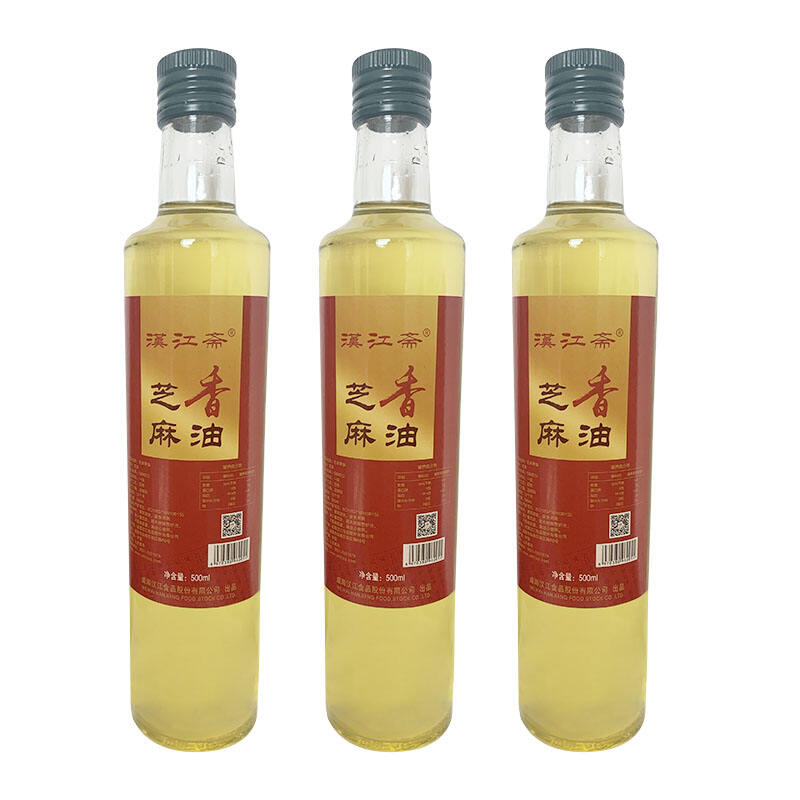The Ancient Culinary Secret Behind Sesame Oil's Growing Popularity
For thousands of years, sesame oil has been a cornerstone of traditional cooking across Asia, but its exceptional qualities are now captivating food enthusiasts worldwide. This golden elixir, pressed from tiny sesame seeds, brings more than just its signature nutty aroma to your kitchen - it offers a perfect blend of flavor, versatility, and health benefits that make it an indispensable cooking companion.
As modern cooking evolves and health-conscious consumers seek better alternatives, sesame oil has emerged as a superior choice that combines culinary excellence with nutritional wisdom. Its rich history and proven benefits have made it a staple in both traditional and contemporary kitchens, offering a unique combination of taste and wellness that few other cooking oils can match.
Understanding the Different Types of Sesame Oil
Light Sesame Oil: The Versatile Kitchen Companion
Light sesame oil, extracted through cold pressing, maintains a subtle flavor profile that makes it perfect for everyday cooking. This variety of sesame oil has a higher smoke point, making it ideal for stir-frying, sautéing, and even deep-frying. Its light golden color and mild taste allow it to enhance rather than overpower your dishes, while still delivering the essential nutrients sesame oil is known for.
The versatility of light sesame oil extends beyond Asian cuisine. It works wonderfully in Mediterranean dishes, salad dressings, and can even be used for baking. Its neutral flavor profile makes it an excellent substitute for other cooking oils, while its nutritional benefits give your dishes a healthy upgrade.
Toasted Sesame Oil: The Flavor Powerhouse
Toasted sesame oil, with its deep amber color and intense nutty aroma, is the secret weapon in many Asian kitchens. This variety is made by pressing roasted sesame seeds, resulting in a more concentrated flavor that can transform ordinary dishes into culinary masterpieces. While it's typically used as a finishing oil, its rich taste makes it perfect for marinades, dressings, and adding depth to sauces.
The distinctive flavor of toasted sesame oil means a little goes a long way. Just a few drops can elevate the taste of stir-fries, noodles, or rice dishes. Its intense aroma and taste make it an essential ingredient for authentic Asian cuisine, while also offering exciting possibilities for fusion cooking.
Health Benefits and Nutritional Value
Essential Nutrients and Antioxidants
Sesame oil is packed with vital nutrients that support overall health and wellness. Rich in vitamin E, sesamin, and sesamolin, it provides powerful antioxidant properties that help combat free radicals in the body. These compounds work together to support immune function and protect cells from oxidative stress, making sesame oil not just a tasty addition but a healthy one too.
The oil's high concentration of healthy fats, including omega-6 and omega-9 fatty acids, contributes to heart health and helps maintain healthy cholesterol levels. Regular consumption of sesame oil as part of a balanced diet can support cardiovascular health and provide sustained energy throughout the day.

Anti-inflammatory Properties and Digestive Benefits
The natural compounds in sesame oil have been shown to possess anti-inflammatory properties, making it beneficial for joint health and overall inflammation management. Its unique composition helps enhance the absorption of fat-soluble vitamins and nutrients, supporting better digestive health and nutrient utilization.
Traditional medicine systems have long recognized sesame oil's therapeutic properties, including its ability to support oral health when used in oil pulling practices. Modern research continues to validate these traditional uses, revealing new benefits of this ancient oil.
Cooking Applications and Storage Tips
Best Cooking Methods and Temperature Guidelines
Understanding how to properly use sesame oil in cooking is key to maximizing its benefits and flavor potential. Light sesame oil, with its higher smoke point of around 410°F (210°C), is excellent for high-temperature cooking methods. It maintains stability during heating, making it perfect for stir-frying vegetables, meat, and seafood without breaking down or producing harmful compounds.
Toasted sesame oil, however, should be used primarily as a finishing oil or at lower temperatures to preserve its delicate flavor compounds. Adding it at the end of cooking or using it in cold preparations helps maintain its rich taste and aromatic properties. This approach ensures you get the most out of this premium ingredient while preserving its nutritional benefits.
Proper Storage and Shelf Life
To maintain the quality and extend the shelf life of sesame oil, proper storage is essential. Keep the oil in a dark glass bottle or original container, away from direct sunlight and heat sources. The ideal storage temperature is between 60-70°F (15-21°C), typically in a cool pantry or cabinet.
When stored correctly, light sesame oil can last up to one year, while toasted sesame oil typically maintains its quality for about six months after opening. Always check for any changes in color, smell, or taste, as these can indicate deterioration. Using a clean, dry spoon when dispensing the oil helps prevent contamination and extends its shelf life.
Culinary Tips and Creative Applications
Enhancing Traditional Recipes
Sesame oil can transform traditional recipes with its unique flavor profile. In Asian cuisine, it's essential for authentic dishes like Korean bibimbap, Chinese stir-fries, and Japanese ramen. The oil adds depth and complexity to marinades, while a few drops can enhance the umami flavor of soups and broths.
Beyond Asian cooking, sesame oil can elevate Mediterranean and Middle Eastern dishes. Try drizzling it over hummus, incorporating it into tahini-based sauces, or using it to finish grilled vegetables. Its versatility allows for creative experimentation while maintaining the integrity of traditional recipes.
Modern Fusion and Innovative Uses
Contemporary chefs are discovering innovative ways to incorporate sesame oil into modern cuisine. It can be used to create unique salad dressings, flavored mayonnaise, or as a base for modern fusion sauces. The oil's distinct taste works surprisingly well in unexpected applications, such as drizzling over vanilla ice cream or incorporating it into chocolate truffles for an Asian-inspired dessert.
In the realm of plant-based cooking, sesame oil has become increasingly popular for adding depth and richness to vegetarian and vegan dishes. Its robust flavor can help create satisfying meat alternatives and enhance the taste of plant-based proteins.
Frequently Asked Questions
How can I tell if sesame oil has gone rancid?
Fresh sesame oil should have a pleasant, nutty aroma and clean taste. If you notice a sharp, bitter smell, off-putting flavor, or any signs of cloudiness, these are indicators that the oil may have spoiled. Always trust your senses and discard any oil that shows these signs of rancidity.
Can sesame oil be used for deep frying?
Light sesame oil can be used for deep frying due to its high smoke point, though it may be more economical to reserve it for other cooking methods. Toasted sesame oil should not be used for deep frying as its low smoke point and intense flavor make it unsuitable for this purpose.
Is organic sesame oil worth the higher price?
Organic sesame oil often offers superior quality and purity, as it's produced without synthetic pesticides or chemicals. While it may cost more, the investment can be worthwhile for those prioritizing organic ingredients and environmental sustainability. The choice ultimately depends on your personal preferences and cooking needs.
How does sesame oil compare to other cooking oils?
Sesame oil stands out for its unique flavor profile and nutritional benefits compared to other cooking oils. While olive oil is known for its heart-healthy properties and coconut oil for its medium-chain triglycerides, sesame oil offers a distinct combination of antioxidants, vitamin E, and healthy fats, along with its characteristic nutty flavor that can't be replicated by other oils.

 EN
EN
 DA
DA
 AR
AR
 NL
NL
 FI
FI
 FR
FR
 DE
DE
 EL
EL
 HI
HI
 IT
IT
 JA
JA
 KO
KO
 NO
NO
 PL
PL
 PT
PT
 RU
RU
 ES
ES
 SV
SV
 TL
TL
 ID
ID
 SR
SR
 UK
UK
 VI
VI
 HU
HU
 TH
TH
 TR
TR
 FA
FA
 AF
AF
 MS
MS
 GA
GA
 MK
MK
 HY
HY
 KA
KA
 BN
BN
 LA
LA
 MN
MN
 NE
NE
 MY
MY
 KK
KK
 UZ
UZ
